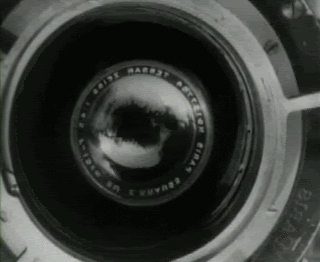
A while ago the world remembered Sergei Eisenstein and his movie Battleship Potemkin due to this “Doodle” that the omnipresent search engine dedicate to him:

But when it’s about the theoretical and artistic contributions of the soviet cinema to the world cinematography, is often forgotten who maybe was the most radical and creative of it’s representatives: Dziga Vertov (1896 - 1954):
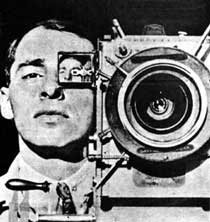
Vertov developed a whole of avant-garde theories for the creation of experimental and artistic films but he was also profoundly connected to the social reality of his era. Starting with his proposal of the Kino-Eye he tried to establish cinema in a own language, autonomous and universal, that could be understood by viewers from all parts of the world without the need of written or spoken language nor the limitations of it. His most representative work where he puts in practice these premises is “Man with a Movie Camera (U.R.S.S. 1929)", considered on the list of the best movies in the history of cinema, being in the first ten.
In the initial credits of this film, Vertov explains his particular project:
"The film Man with a Movie Camera represents
AN EXPERIMENTATION IN THE CINEMATIC COMMUNICATION
Of visual phenomena
WITHOUT THE USE OF INTERTITLES
(a film without intertitles)
WITHOUT THE HELP OF A SCENARIO
(a film without a scenario)
WITHOUT THE HELP OF THEATRE
(a film without actors, without sets, etc.)
This new experimentation work by Kino-Eye is directed towards the creation of an authentically international absolute language of cinema on the basis of its complete separation from the language of theatre and literature."
This movie is a kind of experimental documentary that registers what happens in one day from sunrise to sunset in the city of St. Petersburg, capitol of the Soviet Union in that moment. Simultaneously, as the movie advances we can see the filming, editing and screening process of the documentary itself, being in this way a work that studies itself and speaks about the fact of filming a reality to manipulate it later in the process of montage and post-production.
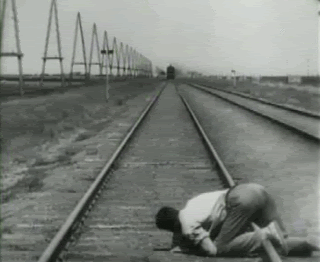
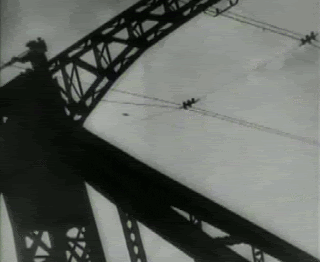
the city and standing in the most unusual places to achieve amazing planes
This is a work considered to be forerunner of the documentary cinema, the author cinema and even of the videoart and videoclip (numerous and creative soundtracks has been made to musicalize this jewel of the silent cinema). I’ve been witness of how Man with a movie camera has been analyzed, debated and honored by visual artists, documentarist, videographers and cinephiles equally all around the world.
This movie has a vertiginous edition rhythm where different realities overlap and strain each other dialectically (for example there is a scene when we see an alternation between a women putting make up and a women worker of the mines of coal with her face smudged by the smoke)
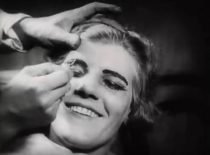
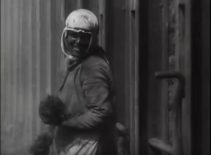
In this film we can see a diversity of montage and edition artifices that now are commonly used but they don’t stop to surprise us because of the strength and beauty that they succeed to show in this work. We see in Man with a movie camera maybe one of the first stop motion animations in the history, the camera that belonged to the operator Mikhail Kauffman taking life of its own.
We also found beautiful scenes in slow motion that speed up or freeze, multiple expositions that manage to show different shots in one frame, almost surrealist montages, among others.
Personally, as a post-productor, this is my favorite film of all time. The first time I knew about it was in my early years as an art student, around the year 2004. Searching for information about Videoart, I've found an art exhibition in Spain where there was a projection for 72 continuous hours of experimental audiovisual works, starting and closing with this film. I immediately went to the offices of the National Film Library of my country: Venezuela (Youtube wasn’t around yet) in Caracas and for an almost symbolic amount of money I saw this film in a little cubicle specially conditioned for movie researchers. When I left the place I felt like I saw the origin of all artistic and documentary cinema until our time.
That’s why every time I can, I do the mention of this forgotten author and his marvelous piece: Man with a movie camera, hoping that those who never saw it, left themselves to be surprised and seduced for this film made almost one hundred years ago but that hasn't lost its validity.
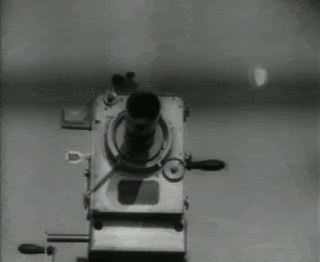
Enjoy it!
(All the gifs and images in this post were extracted and created from the film itself, unless is noted otherwise. Translated from the original post in spanish by my beloved @hilandera)